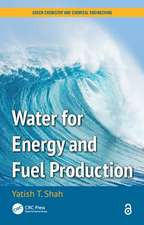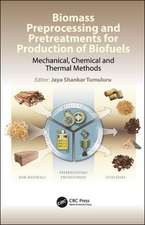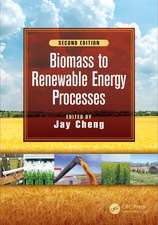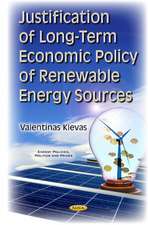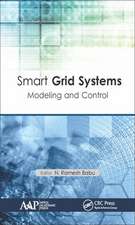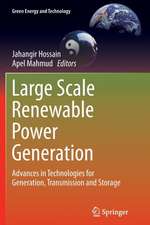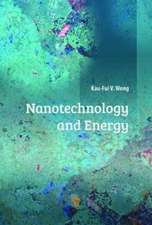Renewable Energies for Central Asia Countries: Economic, Environmental and Social Impacts: NATO Science Series: IV:, cartea 59
Editat de Aldo Iacomellien Limba Engleză Hardback – 12 ian 2006
Since the Kyoto Protocol entered into force on 16 February 2005 an investment on rational use of energy, savings and efficiency is the main premise supporting the development of new energy sources needed to meet the target of the KP and UNFCCC. If energy consumption decreases, renewable sources could cover a significant part of the demand of energy (in particular electricity), if consumption remains uselessly high because inefficient and less energy-consuming (acting also on final uses), renewable energy would become a reality, a feasible method even in these sectors. With investments being equal (today all in the sector of generation from fossil sources), if there were parallel researches on how to reduce consumption and wastes considerably (at least 35%) and on power plants from renewable sources, there would be also a reduction of gas emissions, without any negative influence on development.
New technologies (and new "energy products") will play a crucial role in the development of a market of "sustainable energy products" that should grow in a competitive way (cost-effective) to stand against the challenge of change.
| Toate formatele și edițiile | Preț | Express |
|---|---|---|
| Paperback (1) | 1212.84 lei 6-8 săpt. | |
| SPRINGER NETHERLANDS – 12 ian 2006 | 1212.84 lei 6-8 săpt. | |
| Hardback (1) | 1218.83 lei 6-8 săpt. | |
| SPRINGER NETHERLANDS – 12 ian 2006 | 1218.83 lei 6-8 săpt. |
Din seria NATO Science Series: IV:
- 18%
 Preț: 1225.94 lei
Preț: 1225.94 lei - 15%
 Preț: 640.06 lei
Preț: 640.06 lei - 18%
 Preț: 953.65 lei
Preț: 953.65 lei - 18%
 Preț: 950.84 lei
Preț: 950.84 lei - 18%
 Preț: 950.96 lei
Preț: 950.96 lei - 18%
 Preț: 948.61 lei
Preț: 948.61 lei - 18%
 Preț: 945.92 lei
Preț: 945.92 lei - 15%
 Preț: 644.63 lei
Preț: 644.63 lei - 18%
 Preț: 945.92 lei
Preț: 945.92 lei -
 Preț: 402.56 lei
Preț: 402.56 lei - 18%
 Preț: 1229.91 lei
Preț: 1229.91 lei - 15%
 Preț: 646.43 lei
Preț: 646.43 lei - 15%
 Preț: 647.08 lei
Preț: 647.08 lei -
 Preț: 394.51 lei
Preț: 394.51 lei - 18%
 Preț: 1230.21 lei
Preț: 1230.21 lei - 15%
 Preț: 657.57 lei
Preț: 657.57 lei - 18%
 Preț: 1835.83 lei
Preț: 1835.83 lei - 18%
 Preț: 1825.12 lei
Preț: 1825.12 lei - 18%
 Preț: 958.73 lei
Preț: 958.73 lei - 18%
 Preț: 951.29 lei
Preț: 951.29 lei - 18%
 Preț: 944.51 lei
Preț: 944.51 lei - 18%
 Preț: 1015.55 lei
Preț: 1015.55 lei - 15%
 Preț: 647.08 lei
Preț: 647.08 lei - 18%
 Preț: 1827.80 lei
Preț: 1827.80 lei - 18%
 Preț: 1835.53 lei
Preț: 1835.53 lei -
 Preț: 395.63 lei
Preț: 395.63 lei - 18%
 Preț: 944.99 lei
Preț: 944.99 lei
Preț: 1218.83 lei
Preț vechi: 1486.38 lei
-18% Nou
Puncte Express: 1828
Preț estimativ în valută:
233.25€ • 242.62$ • 192.56£
233.25€ • 242.62$ • 192.56£
Carte tipărită la comandă
Livrare economică 14-28 aprilie
Preluare comenzi: 021 569.72.76
Specificații
ISBN-13: 9781402039249
ISBN-10: 1402039247
Pagini: 212
Ilustrații: XXV, 182 p.
Dimensiuni: 155 x 235 x 17 mm
Greutate: 0.48 kg
Ediția:2005
Editura: SPRINGER NETHERLANDS
Colecția Springer
Seria NATO Science Series: IV:
Locul publicării:Dordrecht, Netherlands
ISBN-10: 1402039247
Pagini: 212
Ilustrații: XXV, 182 p.
Dimensiuni: 155 x 235 x 17 mm
Greutate: 0.48 kg
Ediția:2005
Editura: SPRINGER NETHERLANDS
Colecția Springer
Seria NATO Science Series: IV:
Locul publicării:Dordrecht, Netherlands
Public țintă
ResearchCuprins
Renewable Energy (RE), Energy Efficiency (EE) & Energy Services: The Energy Market Transformation.- Promoting Effective and Efficient Public Private Partnerships (PPPs).- The Clean Development Mechanism: New Instrument in Financing Renewable Energy Technologies.- International Co-Operation on Energy Technologies Research and Development.- Market Deployment of Renewable Energy in Central Asia: Implications for Energy Diversification.- World Energy Outlook 2004: Key Findings and Messages.- Main Achievements of the IEA Programme on Hydropower Technologies.- Renewable Resources to Hydrogen: Appropriated Technologies for Developing Countries.- The Conception of the Use of Renewable Energy Sources and Their Role in the Energy Balance of Uzbekistan.- Current State and Prospects of Renewable Energy Technology in Russia.- The Hybrid Solar — Wind Source of the Electro Energy and Prospect of Its Application.- New Methods for Improvement of Efficiency of Solar Cells on the Basic Si-Monocrystals.- Design of Semiconductor Nanostructures for Solar Cell Application.- Utilization Possibilities of Renewable Sources of Energy in Southern Kazakhstan by the Example of Karatausko-Ugamski Energy Complex.- Renewable Energy: Environmental and Nature Protection Aspects.- To the Problem of Production and Using of Biofuel in Conditions of Uzbekistan.
Caracteristici
Learn from Central Asian countries the potentiality of renewable in such areas Investigate policy option for new market for renewable technology Test economic path for the Kyoto protocol implementation




